|
|
|
Sort Order |
|
|
|
Items / Page
|
|
|
|
|
|
|
| Srl | Item |
| 1 |
ID:
177493
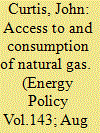

|
|
|
|
|
| Summary/Abstract |
This research examines fuel choice for residential heating, with a particular focus on switching to natural gas from carbon intensive alternatives. In the context of reducing greenhouse gas emissions in the residential sector, fuel switching from coal and oil to natural gas for space heating is assessed as a potential policy option using Ireland as a case study. A range of building attributes and household characteristics are associated with fuel choice for household space heating, including distance to the gas network, which is inversely associated with the probability of gas connection. Distance decay effects are likely attributed to network connection fees, which are proportional to the connection distance. The impact of setting the marginal connection cost associated with distance to zero are simulated to examine emission and expenditure impacts across socio-economic groups. Up to 13% of unconnected properties are likely to respond to such an incentive, yielding a 3.9% reduction in greenhouse gas emissions and a 1.5% reduction in fuel expenditure relative to pre-policy levels of unconnected households within the study. Expenditure and emission impacts differ across socio-economic groups with the largest reductions expected to occur among semi-skilled/unskilled households, which are frequently among the least affluent households.
|
|
|
|
|
|
|
|
|
|
|
|
|
|
|
|
| 2 |
ID:
177486


|
|
|
|
|
| Summary/Abstract |
Sub-Saharan Africa faces several challenges that hamper the effort to provide universal electricity access. The challenges are not the result of lack of energy resources but rather the result of governance and institutional problems as well as lack of capital to meet the high investment requirement. This study aims to provide relevant policy recommendations to facilitate the path towards universal electricity access in Sub-Saharan Africa. We do this by identifying the barriers for electricity access and the relevant actors, institutions, and regulations using desk research, stakeholder interviews and expert workshops. The results show that the absence of overall plans and approaches and lack of clarity in policies are the main challenges for the sector. Setting standards for electricity products, such as solar panels, could help to reduce the problem of counterfeit poor quality products. A broader participation of non-governmental actors is needed to increase the speed of electrification. This requires innovative revenue schemes, financial and fiscal incentives and elimination of market distortions. More generally, we conclude that stable and consistent policy frameworks and improved coordination between actors, are crucial to accelerate electrification in the region.
|
|
|
|
|
|
|
|
|
|
|
|
|
|
|
|
| 3 |
ID:
177492


|
|
|
|
|
| Summary/Abstract |
The supply side of sustainable housing needs to be complemented with, driven by, and shaped around a willing and committed demand site. This study examines the sustainable housing sector of Pakistan by describing the potential buyers’ profile and quantifying their willingness to pay (WTP) for sustainable housing uptake in the market. WTP is estimated through a survey of 354 potential homebuyers. Furthermore, the hierarchical Bayesian model of adaptive choice-based conjoint analysis is utilized to study the correlation of descriptive determinants on WTP for sustainable housing. The results suggest that demographical factors of age, gender, and literacy level positively correlate with WTP whereas environmental knowledge and income level negatively correlate with WTP. Also, energy saving has the highest relative importance among other housing attributes. The study contributes a vital empirical input to the literature by finding the potential sustainable homebuyers in Pakistan and their characteristics and proposes several policy guidelines to promote the uptake of the sustainable housing sector in the country.
|
|
|
|
|
|
|
|
|
|
|
|
|
|
|
|
| 4 |
ID:
177501


|
|
|
|
|
| Summary/Abstract |
Under the background of removing the subsidies for the new energy vehicles step by step and increasing the subsidies for the charging facilities in China, getting a comprehensive understanding on public's perception and attitudes towards new energy vehicles and charging facilities is significant to the policymakers. To fulfil these goals, we design and perform a random survey in Beijing, Shanghai, Guangzhou and Shenzhen, the four first-tier cities in China from July 2019 to December 2019. In the survey, we not only investigate the public's attitudes to new energy vehicles but also ask the willingness to pay (WTP) for the use of charging facilities. We find that those persons who are male, younger or having higher family monthly income are willing to pay more for the use of charging facilities. If the interviewee has better knowledge about the new energy vehicles or considers that the new energy vehicles can improve the air quality, he/she also would like to pay more. Finally, the WTP for the charging facilities is estimated to be 0.836 yuan/kWh extra and WTP for different group of interviewees is also analyzed. Therefore, in the initial development of charging facilities, subsidies are necessary but they should be removed later.
|
|
|
|
|
|
|
|
|
|
|
|
|
|
|
|
| 5 |
ID:
177490
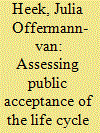

|
|
|
|
|
| Summary/Abstract |
Reducing the high CO2 emissions from the transportation sector requires alternatives to current fossil-based power trains. One possible approach is the development of alternative fuels produced from CO2, water, and renewable energy. Besides technological feasibility of required process steps (CO2 capture, CO2 transport, fuel production infrastructure), a successful adoption requires acceptance of alternative CO2-based fuels and their infrastructure. This study focuses on public acceptance of CO2-based fuels' life cycle by laypeople (N = 325) using conjoint analysis. The laypeople evaluated life cycle scenarios consisting of diverse options regarding CO2 capture, transport, and production infrastructure. To analyze the impact of information on acceptance evaluations, all respondents received information on energy efficiency and environmental impact of the process step options (2nd evaluation stage). The results revealed that CO2 source and transport are most relevant for participants' decisions. Significant impacts of information were found: higher levels of information changed extremely the evaluation of the CO2 capture options (e.g., air capture, chemical plant). The results highlight the importance of investigating laypeople's evaluations of life cycle scenarios, emphasize the relevance of providing adequate information to laypeople, and enable to derive information recommendations to reach a sustained public adoption of alternative fuels and their life cycle.
|
|
|
|
|
|
|
|
|
|
|
|
|
|
|
|
| 6 |
ID:
177499


|
|
|
|
|
| Summary/Abstract |
This study provides empirical evidence on the association between board attributes and corporate social responsibility (CSR) engagement—as well as between CSR engagement and corporate performance—in the global energy sector. The data for the period of 2011–2018 was obtained from Thomson Reuters. The results indicate that board diligence and CSR committees are robust drivers of CSR performance, as proxied by the composite environmental, social, and governance (ESG) score along with its three individual indicators. While board independence is more influential in boosting the aggregate ESG score and the governance indicator, the board's gender diversity is more influential in environmental and governance indicators. However, higher CSR performance does not guarantee higher financial performance—as proxied by both market and accounting performance. We provide theoretical and practical implications, to guide regulators and energy firms in ensuring the sustainable development of the sector.
|
|
|
|
|
|
|
|
|
|
|
|
|
|
|
|
| 7 |
ID:
177504


|
|
|
|
|
| Summary/Abstract |
State regulation in the electricity sector is essential for economic development and serves as a foundation for sustainability in the modern world. Several incentives have been put in place to stimulate energy generation through renewable resources in Brazil, starting with Decree 5.163 from 2004 and Normative Resolution – REN no. 482 from ANEEL (National Electricity Regulatory Agency), which established ways for consumers to generate electricity for their own consumption using renewable sources, and to distribute this energy back to the grid via a net-metering system. This article addresses the issue of electric energy control, generation, and distribution, and gives new perspectives from within the Distributed Generation (DG) system. The main objective of this article is to analyze the incentive mechanisms for DG in Brazil from a constitutional standpoint, which were set forth to promote economic development in the Federal Constitution of 1988. Furthermore, this study discusses the regulatory nature of the State, and changes to its role in economic intervention, discussing economic development concepts for how regulation might impact the development and promotion of DG in Brazil.
|
|
|
|
|
|
|
|
|
|
|
|
|
|
|
|
| 8 |
ID:
177508


|
|
|
|
|
| Summary/Abstract |
Energy transitions change the relationships between technologies and human actors. Demand response (DR), the matching of demand to available electricity supply, is a relatively new activity, important for systems that rely on distributed renewable generation. Price-based DR is spreading among residential and small business customers, along with direct control of distributed and aggregated small loads, mostly thermal. In both types of DR, information and communication technology plays a part.
|
|
|
|
|
|
|
|
|
|
|
|
|
|
|
|
| 9 |
ID:
177496
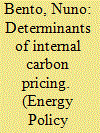

|
|
|
|
|
| Summary/Abstract |
Action against climate change is urgent and requires the participation of firms. The progressive internalization of carbon costs by firms is essential in the transition to a low-carbon economy. Internal carbon pricing is an emerging set of practices voluntarily adopted by companies to embed climate footprint in operations and business models. We explore the factors that explain the adoption of internal carbon prices (ICP) among global companies reporting to the Carbon Disclosure Project between 2015 and 2017. We specifically test whether the macroeconomic, regulatory, industry, and firm-specific characteristics affect the disclosed level of the ICPs. Results show that the ICPs depend to a large extent on the national climate policy, country's development, industry, and corporate governance. Furthermore, context explain more the differences in ICP than industry and firm-specific characteristics. Thus uncertainties around countries' climate policy hampers carbon pricing in business. These findings shed light on the factors that contribute to the dissemination of carbon pricing in society.
|
|
|
|
|
|
|
|
|
|
|
|
|
|
|
|
| 10 |
ID:
177482
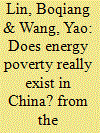

|
|
|
|
|
| Summary/Abstract |
China is undergoing a market-oriented reform in energy and the residential sector will be involved in the near future. The analysis of energy poverty is crucial in breaking the illusion of the dilemma between enhancing energy efficiency and controlling poverty. Based on Chinese residential energy consumption survey, we firstly estimated the energy poverty in China by the “10% indicator” and “LIHC indicators”, and then proposed a “minimum end-use” method to classify the energy-poor households into lifeline and consumption energy poverty. Results show that energy poverty exists in China at the proportion of 18.9%, and 46% of the energy-poor houses are in short of modern energy consumption and are sensitive to tariffs, with a level of electricity consumption lower than the basic demand. The energy poverty rate is highest in central China, while the lifeline energy poor are relatively concentrated in the western region. In terms of public policy, we suggest focusing on heterogeneity by considering different groups of households when implementing energy efficiency measures, and targeting more on the consumption energy poor in poverty alleviation. We also suggest paying particular attention to targeting households with low income by supporting practices such as coupons for energy consumption and appliance purchasing.
|
|
|
|
|
|
|
|
|
|
|
|
|
|
|
|
| 11 |
ID:
177488


|
|
|
|
|
| Summary/Abstract |
In liberalised energy markets, electricity from Renewable Energy (RE) using Solar PV and Wind Turbines requires financial support because the expected number of generation hours is insufficient to induce private investment. Such support has a direct cost from the additional expenditure over what would have been incurred had fossil fuel generation been used and indirect costs arising from the random and distributed nature of the RE output. Comparing European Union countries between 2007 and 2017, we find the pricing structure of retail electricity is regressive and correlated to reliance upon RE. Although initially, the direct and indirect costs of RE affects integrated utilities and aggregators, the ultimate burden largely falls upon lower income cohorts. Given policy objectives for RE, these finding are worrisome. Though as a society we may benefit from reducing dependence upon fossil fuels, the burden of this transition falls upon those with the lowest income, raising questions over fairness. Explaining the reasons for fiscal regressiveness leads to suggestions on how it may be redressed.
|
|
|
|
|
|
|
|
|
|
|
|
|
|
|
|
| 12 |
ID:
177485
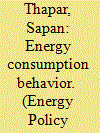

|
|
|
|
|
| Summary/Abstract |
Counted among the top three energy consuming nations globally, India is working towards reducing its carbon emissions. Energy efficiency interventions offers a low-cost opportunity to achieve its climate goals. Though the Indian government has rolled out several energy efficiency schemes, the rate of decrease in energy intensity is lower than expectations. One of the desirable areas for intervention is influencing energy usage in households, which consumes a quarter of the total energy generated in India. The study analyzes energy usage behavior in households, using a mix of primary and secondary techniques. Key findings include seasonal consumption trends correlating with climatic parameters, use of inefficient equipment and rebound effect. Policy prescriptions include peak load clipping techniques like weatherization of homes, display of real-time consumption, rationalization of tariffs and expanded criteria for selecting equipment under ‘Star Rating Scheme’. The findings may be considered to improve energy policies towards influencing consumer behavior in India.
|
|
|
|
|
|
|
|
|
|
|
|
|
|
|
|
| 13 |
ID:
177507


|
|
|
|
|
| Summary/Abstract |
Energy Systems Integration (ESI) is an emerging paradigm and at the centre of the EU energy debate. ESI takes a holistic view of the electricity, gas, and heat sectors to deliver a clean, reliable, and affordable energy system. By using the synergies within and between sectors, ESI aims to increase flexibility in the energy system, maximise the integration of renewable energy and distributed generation, and reduce environmental impact. While ESI-enabling technologies have been studied from a technical perspective, the economic, regulatory, and policy dimensions of ESI are yet to be analysed in depth. This paper discusses ESI in a multi-step approach. We first focus on the economics of ESI-enabling technologies. Then we briefly discuss how the EU national regulators incentivise their adoption. Major economic and policy barriers to ESI are identified and policy solutions to overcome these barriers are proposed. We conclude that current regulatory frameworks in the EU do not sufficiently stimulate ESI investments and only through proper design of incentives ESI can be adopted.
|
|
|
|
|
|
|
|
|
|
|
|
|
|
|
|
| 14 |
ID:
177487
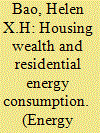

|
|
|
|
|
| Summary/Abstract |
The housing wealth effect often manifests as a positive relationship between consumption and perceived housing wealth (e.g. the perceived value of houses). When the perceived value of a property rises, homeowners may feel more comfortable and secure about their wealth, causing them to spend more. This study adopts a behavioural approach to verify if this relationship holds true for residential energy consumption in the UK. While controlling for property characteristics and a large number of demographic, socioeconomic and energy-use behaviour variables, we identified a significant relationship between housing wealth and energy consumption. Our models also considered psychological biases in energy consumption behaviours, such as the framing effect. Our findings shed light on the behavioural aspects of housing wealth effect on residential energy consumption and demonstrate the potential to ‘nudge’ households towards energy conservation. Most importantly, we provide empirical evidence on the intriguing relationship among housing wealth, residential energy consumption and fuel poverty. The findings of this study are particularly helpful in designing and implementing energy consumption policies that can strike a balance between social justice and economic efficiency.
|
|
|
|
|
|
|
|
|
|
|
|
|
|
|
|
| 15 |
ID:
177494


|
|
|
|
|
| Summary/Abstract |
At present, China is undergoing industrial restructuring. However, the resource misallocation problem in China is still serious, which may affect China's green total factor energy efficiency (GTFEE). Based on previous studies, misallocation may be exacerbated by corruption, which would further inhibit GTFEE. In this study, we utilize the provincial panel data of 30 provinces in China from 2005 to 2016 to investigate the relationship between misallocation, corruption and GTFEE by employing appropriate spatial econometric methods and panel threshold model. The results indicate that there is spatial dependence in GTFEE. Local GTFEE is negative impacted by labor misallocation, while it is not affected by labor misallocation in the neighboring area. There is also evidence that capital misallocation in the local area is negatively correlated with GTFEE, although not statistically significant; while the capital misallocation in the neighboring area has significant negative correlation with local GTFEE. The results also indicate that GTFEE is not significant affected by corruption. It is also found that local corruption would aggravate the inhibiting effect of labor resource misallocation on GTFEE, while the inhibiting effect of capital resource misallocation on GTFEE would not be affected by local government corruption.
|
|
|
|
|
|
|
|
|
|
|
|
|
|
|
|
| 16 |
ID:
177476


|
|
|
|
|
| Summary/Abstract |
Renewable portfolio standards (RPS) and carbon tax policy, as efficient regulatory policy tools for realizing energy low-carbon transformation, can they achieve incentive regulation for power producers based on the decisive role of “visible hands” and “invisible hands” in the utilization and allocation of resources. It will become the critical scientific issue of China's power market reform. This paper constructs an equilibrium model of power market under the overlapping regulation of carbon tax policy and RPS, studies the influence of RPS and carbon tax policy on the power market, and analyzes whether they can help motivate green power producers to reduce production costs. The results show that the overlapping regulation can help to increase the proportion of renewable energy generation production in the power market and optimize the power supply structure. Still, it is difficult to form effective incentive regulation for power producers. On the premise of meeting the quota, the green power producers can increase the feed-in tariffs and achieve higher profits by colluding to realize cost padding. Therefore, the realization of incentive regulation is conducive to weaken information asymmetry to achieve the scientific regulation of power producers and effectively promote the process of China's power market reform.
|
|
|
|
|
|
|
|
|
|
|
|
|
|
|
|
| 17 |
ID:
177481


|
|
|
|
|
| Summary/Abstract |
We contribute to research on governance of state-owned electric utilities by examining the implications of oversight by independent versus ‘political’ directors for corporate strategy. While policy think-tanks often recommend that governments appoint independent professional directors to boards of state-owned corporations, governments sometimes select politicians who bring a politically-oriented perspective to their oversight duties. To examine the potential strategic consequences, we draw on a novel survey of 384 directors of municipally-owned local electricity distribution companies in Canada, of which about a third were elected municipal councillors and the remaining were independent business professionals. The survey solicited individual director views about strategic priorities, including mergers and acquisitions, business diversification, and corporate financing options. Our statistical analysis of the survey response data finds that political directors, after controlling for prior executive experience and organizational context, were more risk-tolerant on average than independent directors, as evidenced by a greater willingness to diversify into unregulated business activities and to acquire equity stakes in other utilities; but at the same time, they prioritized enhanced dividend payments to the municipal government over re-investment in the corporation, a potential constraint on future business growth.
|
|
|
|
|
|
|
|
|
|
|
|
|
|
|
|
| 18 |
ID:
177474


|
|
|
|
|
| Summary/Abstract |
This paper investigates how to implement residential dynamic taxation in Denmark. To this end, it proposes three dynamic schemes that can be implemented by the Danish government. In particular, the paper studies one Ad-valorem and two different per-unit tax schemes, which respectively depend on electricity consumption and CO emissions. A second contribution of the paper is to perform a holistic impact assessment based on six different categories, which decision makers can utilize to evaluate taxation schemes. These are: CO emissions saved; the social cost of CO savings; revenue neutrality; the composition of the production mix; transparency and predictability of taxation schemes; and how much consumption can be shifted. Based on the findings, a recommendation directed at Danish decision makers in the energy sector is presented. Results stand in contrast to earlier findings in the literature and suggest that a per-unit (excise) dynamic taxation scheme that depends on the level of consumption is preferred over a per-unit taxation scheme that depends on CO emissions or an Ad-valorem tax on the retail electricity price. This assessment is based on the considerations that the preferred scheme: (1) incentivizes greater demand-side flexibility, (2) reduces CO emissions more efficiently, (3) depends on a predictable random variable, i.e. electricity consumption.
|
|
|
|
|
|
|
|
|
|
|
|
|
|
|
|
| 19 |
ID:
177497


|
|
|
|
|
| Summary/Abstract |
A German panel data of vehicle and owner characteristics is used to analyse the incidence of additional carbon taxes. It is shown that an additional carbon tax on fuel used for private transportation is regressive when there is no allocation of tax revenue. When smoothing consumption across time in the face of additional carbon taxes, low income households can reduce the tax burden. When the cost of air pollution is included in the metric for the tax incidence, the tax burden decreases considerably. It is also found that in order to charge drivers for the attributed emissions, carbon taxes need to be set at least at €30 per tonne of CO2 emissions. Moreover, the estimated own price elasticities suggest that an additional carbon tax may fail to induce owners of vehicles with an intense usage to reduce energy consumption. Consequently, carbon taxes need to be designed jointly with other taxes to target heavy polluters.
|
|
|
|
|
|
|
|
|
|
|
|
|
|
|
|
| 20 |
ID:
177483


|
|
|
|
|
| Summary/Abstract |
Combining a unique dataset of 488 public airports and interviews with managers and stakeholders at four airports in the United States, this study investigates how airports’ institutional arrangements shape their solar photovoltaic (PV) deployment decisions. The findings indicate that airports operated by general-purpose governments (i.e., city, county, or state governments) are more likely to deploy solar PV than airports operated by special-purpose governments (i.e., port or airport authorities). Airports more involved in the professional associations (e.g., the American Association of Airport Executives) are also more likely to deploy solar PV, but this relationship is stronger for special-purpose airports. Additionally, airport solar PV is less likely to appear in the service area of cooperatives than in the service area of investor-owned utilities. These findings help policymakers understand how airport governance, utility ownership, and involvement in professional associations may promote or hinder renewable energy transitions at airports and other large publicly used properties.
|
|
|
|
|
|
|
|
|
|
|
|
|
|
|
|
|
|
|
|
|